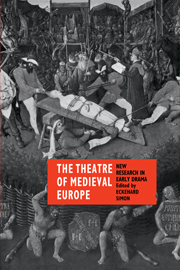Book contents
- Frontmatter
- Contents
- List of contributors
- Preface
- Note on the bibliography and system of references
- List of abbreviations for journals and series
- 1 Introduction: trends in international drama research
- PART I LATIN DRAMA
- 2 Medieval Latin music-drama
- 3 Liturgical drama: falling between the disciplines
- PART II ENGLISH DRAMA
- PART III CONTINENTAL DRAMA
- Bibliography
- Author index to the bibliography
- General index
3 - Liturgical drama: falling between the disciplines
Published online by Cambridge University Press: 29 March 2011
- Frontmatter
- Contents
- List of contributors
- Preface
- Note on the bibliography and system of references
- List of abbreviations for journals and series
- 1 Introduction: trends in international drama research
- PART I LATIN DRAMA
- 2 Medieval Latin music-drama
- 3 Liturgical drama: falling between the disciplines
- PART II ENGLISH DRAMA
- PART III CONTINENTAL DRAMA
- Bibliography
- Author index to the bibliography
- General index
Summary
Of the several issues that inspired the production of this volume, it was easiest to address the question that asked what was lacking in the available material dealing with medieval – in this case liturgical – drama, and it was correspondingly easy to identify what was needed to advance our knowledge. In a few words, what is needed is the production of comprehensive reference tools enabling the user to find information conveniently, and the consolidation, sifting and assessment of the work done within the last century.
The bibliography on the topic is huge. One might ask, in fact, how students could be given a reasonable reading list, even in a seminar devoted specifically to drama. To absorb in detail even the basic literature that is taken for granted – the works of Young, Chambers, Coussemaker, de Boor, Hardison, Corbin, Lipphardt, Smoldon and others who are cited in every other footnote of more recent work – would be itself a Herculean task. My bibliographical search for this article was from about 1976 to the present: Clifford Flanigan's articles of 1975 and 1976, listed in the bibliography, deal with the field up to 1975. One of the most urgent undertakings, then, is to provide a comprehensive reference tool: an annotated bibliography, supplemented by a convenient and usable list of the 600-odd surviving dramas with information about sources and editions, and whether or not the chant is included.
- Type
- Chapter
- Information
- The Theatre of Medieval EuropeNew Research in Early Drama, pp. 42 - 62Publisher: Cambridge University PressPrint publication year: 1991
- 2
- Cited by

